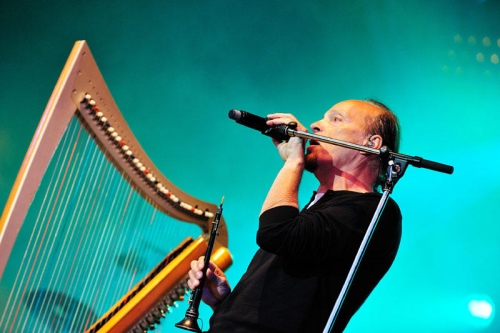Thank you and Enjoy good music!
If you'll see message "No such folder" just rename download link from takefile.link to hdmusic.takefile.link
| Home » Articles » FLAC / APE / WAV |
Artist: Alan Stivell If there is a single savior of Celtic music, Alan Stivell is probably it. Since the end of the 1960s, he has done more to revive interest in the Celtic (specifically Breton) harp than anyone in the world and, in the process, almost singlehandedly made the world aware of native Breton Celtic music. Since 1971, he has been recording albums of extraordinary beauty and diversity, ranging from ancient Breton and Irish material to modern folk-rock and progressive rock.
Stivell was playing concerts at age 11, and he began taking up the more general study of traditional popular Celtic music, including the Scottish bagpipes, drum, Irish flute, and tin whistle, while in his teens. He ultimately became well-versed in all of these and won honors in national piping competitions in Scotland, and chose the professional name of Stivell, the Breton word meaning fountain, spring, or source. By the age of 21, while studying for his degree in English, he became an established folk musician, recording songs to his own harp accompaniment. While his singing is less effective than his harp or bagpipe playing, his voice is expressive, and most of his albums feature a mix of vocal and instrumental music. In 1967, he formed a group consisting of himself on harp, bagpipes, and Irish flute and Dan Ar Bras on electric guitar, backed by bass and drums. He released several albums during this period, including Reflections (1971), A l'Olympia (1972), Chemins de Terre (1972), Celtic Rock (1972), and E. Lagonned (1976). He left the group in the mid-'70s to concentrate exclusively on a solo career -- by this time, he had become a major influence on a multitude of folk-rock musicians with his interweaving of electric and traditional instruments. Stivell's biggest accomplishment, however, involved the rebirth and rediscovery of an instrument and an entire cultural history. His career brought to fruition the revival of the Breton harp that his father had begun in the 1930s and '40s. The harp had a long and honored place in the history of the Celtic peoples, first embraced (and possibly invented) by the primordial Irish people, who carried it to Scotland and Wales, and later to Brittany and the rest of the European mainland. Although preserved as an image in numerous works of art, the Breton harp had receded from memory and use well before the 20th century. Alan Stivell played his father's first modern Breton harp for the first time in 1953, and within 20 years there were over 100 players where there had been none. Stivell has also used harps from Ireland, Scotland, and Wales in his recordings and performances LOSSLESS ALBUMS: MP3 ALBUMS: 1964 Telenn Geltiek (Harpe Celtique) (35:05)
https://hdmusic.takefile.link/folder/8f21ac5f-0568-11e9-b97b-3860779bdc24 If you'll see message "No such folder" just rename download link from takefile.link to hdmusic.takefile.link Please make any music requests here or report about dead links! | |
| Category: FLAC / APE / WAV | Added : (06.11.2023) | |
| 4017 | |
RELATED NEWS:
| Total comments: 0 | |

